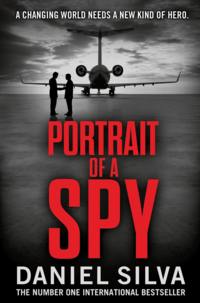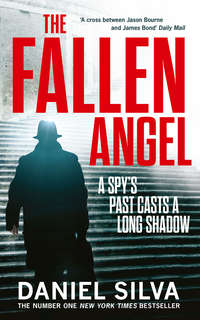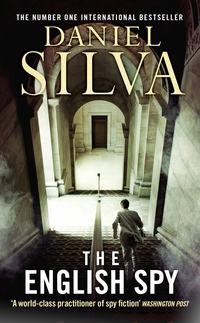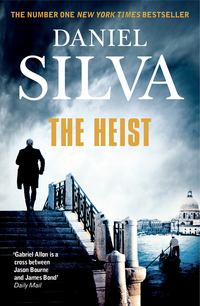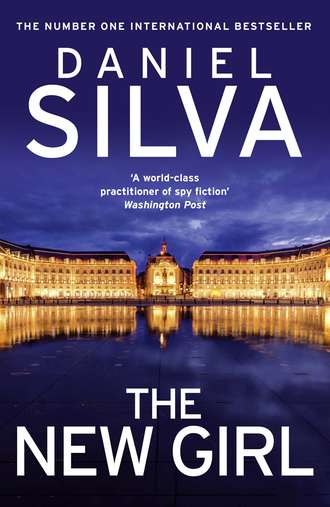
Полная версия
The New Girl
“He looked more like a professor than a French spy.”
“He was once, actually. He’s one of France’s foremost scholars of Proust.”
“What’s the Alpha Group’s role?”
“Human penetration of jihadist networks. But Rousseau has access to everything.”
A uniformed officer approached the car. Gabriel gave him two pseudonymous names, one male, the other female, both French and both inspired by the novels of Dumas, a particularly Rousseauian touch. The Frenchman was waiting in his new lair on the top floor. Unlike the other offices in the building, Rousseau’s was somber and wood-paneled and filled with books and files. Like Gabriel, he preferred them to digital dossiers. He was dressed in a crumpled tweed jacket and a pair of gray flannel trousers. His ever-present pipe belched smoke as he shook Gabriel’s hand.
“Welcome to our new Bastille.” Rousseau offered his hand to Sarah. “So good to see you again, Madame Bancroft. When we met in Israel, you told me you were a museum curator from New York. I didn’t believe it then, and I surely don’t believe it now.”
“It’s true, actually.”
“But obviously there’s more to the story. Where Monsieur Allon is concerned, there usually is.” Rousseau released Sarah’s hand and contemplated Gabriel over his reading glasses. “You were rather vague on the phone this morning. I assume this isn’t a social call.”
“I heard you recently had a bit of unpleasantness in the Haute-Savoie.” Gabriel paused, then added, “A few miles west of Annecy.”
Rousseau raised an eyebrow. “What else have you heard?”
“That your government chose to cover up the incident at the request of the victim’s father, who happens to own the largest château in the region. He also happens to be—”
“The future king of Saudi Arabia.” Rousseau lowered his voice. “Please tell me you didn’t have anything to do—”
“Don’t be ridiculous, Paul.”
The Frenchman nibbled thoughtfully at the stem of his pipe. “The unpleasantness, as you call it, was quickly designated a criminal act rather than an act of terrorism. Therefore, it fell outside the purview of the Alpha Group. It is none of our affair.”
“But you must have been at the table during the first hours of the crisis.”
“Of course.”
“You also have access to all the information and intelligence gathered by the National Police and the DGSI.”
Rousseau pondered Gabriel at length. “Why is the abduction of the crown prince’s daughter of interest to the State of Israel?”
“Our interest is humanitarian in nature.”
“A refreshing change of pace. On whose behalf have you come?”
“The future king of Saudi Arabia.”
“My goodness,” said Rousseau. “How the world has changed.”
15
PARIS
IT SOON BECAME APPARENT THAT Paul Rousseau did not approve of his government’s decision to conceal the abduction of Princess Reema. It had been made easier, he said, by the remote location—the intersection of two rural roads, the D14 and the D38, west of Annecy. As it happened, the first person on the scene was a retired gendarme who lived in a nearby village. The next to arrive were the crown prince himself and his usual retinue of bodyguards. They surrounded the two vehicles of the princess’s motorcade, along with a third vehicle that had been abandoned by the kidnappers. To subsequent passersby it looked like a serious traffic accident involving wealthy men from the Middle East.
“Hardly an unusual occurrence in France,” said Rousseau.
The retired gendarme was sworn to secrecy, he continued, as were the officers who took part in a rapid nationwide search for the princess. Rousseau offered the assistance of the Alpha Group but was informed by his chief and his minister that his services were not required.
“Why not?”
“Because His Royal Highness told my minister that his daughter’s abduction was not the work of terrorists.”
“How could he have known that so quickly?”
“You’d have to ask him. But the logical explanation is—”
“He already knew who was behind it.”
They were gathered around a stack of files piled on Rousseau’s conference table. He opened one and removed a single photograph, which he placed before Gabriel and Sarah. A Range Rover riddled with bullet holes, a smashed Mercedes Maybach, a crumbled Citroën estate car. The corpses of the dead Saudi bodyguards had been removed. Their blood, however, was spattered over the interior of the Range Rover and the Maybach. There was a lot of blood, thought Gabriel, especially in the backseat of the limousine. He wondered whether some of it had been shed by the princess.
“There was at least one other vehicle involved, a Ford Transit van.” Rousseau pointed toward the grassy verge along the D14. “It was parked right here. Maybe the driver was looking under the hood or pretending to change a tire when the motorcade approached. Or maybe he didn’t bother.”
“How do you know it was a Ford Transit?”
“In a minute.” Rousseau pointed toward the smashed front end of the Citroën. “There were no witnesses, but the tire marks and the collision damage paint an accurate picture of what happened. The motorcade was heading west on the D14 toward the crown prince’s château. The Citroën was headed north on the D38. Obviously, it didn’t stop at the intersection. Based on the tire marks, the driver of the Maybach swerved to avoid the collision, but the Citroën struck the driver’s side of the limousine with enough force to damage the armor plating and force it off the road. The driver of the Range Rover slammed on his brakes and came to a stop behind the Maybach. In all likelihood, the four bodyguards were killed instantly. The ballistics and forensic analysis indicate the gunshots came from the direction of both the Citroën and the Ford Transit.”
“How did they get the girl out of an armor-plated car with bulletproof windows?”
Rousseau removed a second photograph from the file. It showed the passenger side of the Maybach. The armor-plated doors had been blown open—rather expertly, thought Gabriel. The Office could not have done it any better.
“I assume your forensics experts analyzed the blood inside the Maybach.”
“It came from two people, the male driver and the female bodyguard. Like the four bodyguards from the Range Rover, they were killed by nine-millimeter rounds. The markings on the shell casings are consistent with an HK MP5 or one of its variants.”
Rousseau produced another photograph. A Ford Transit, light gray. The photograph had been taken at night. The flash of the camera had illuminated a small patch of dry, rocky earth. It was not, thought Gabriel, the soil of the north of France.
“Where did they find it?”
“On a deserted road outside the village of Vielle-Aure. It’s—”
“In the Pyrenees a few miles from the Spanish border.”
“Sometimes I forget how well you know our country.” Rousseau pointed at one of the van’s tires. “It was a perfect match for the tracks found at the scene of the kidnapping.”
Gabriel studied the photograph of the van. “I assume it was stolen.”
“Of course. So was the Citroën.”
“Was there any blood in the storage compartment?”
Rousseau shook his head.
“What about DNA?”
“A great deal.”
“Any of it belong to Princess Reema?”
“We asked for a sample and were told in no uncertain terms we couldn’t have one.”
“By Khalid?”
Rousseau shook his head. “We’ve had no direct contact with the crown prince since he left France. All communication now flows through a certain Monsieur al-Madani of the Saudi Embassy in Paris.”
Sarah looked up suddenly. “Rafiq al-Madani?”
“You know him?”
Sarah made no reply.
“It is my assumption, Miss Bancroft, that you are either a current or former officer of the Central Intelligence Agency. Needless to say, your secrets are safe within these walls.”
“Rafiq al-Madani served at the Saudi Embassy in Washington for several years as the representative of the Ministry of Islamic Affairs. It’s one of the official conduits the House of Saud uses to spread Wahhabism around the globe.”
Rousseau smiled charitably. “Yes, I know.”
“The FBI didn’t care much for al-Madani,” said Sarah. “And neither did the Counterterrorism Center at Langley. We didn’t like the company he’d kept before coming to Washington. And the FBI didn’t like some of the projects he was funding in America. The State Department quietly asked Riyadh to find work for him elsewhere. And much to our surprise, the Saudis agreed to our request.”
“Unfortunately,” said Rousseau, “they sent him to Paris. From the moment he arrived, he’s been funneling Saudi money and support to some of the most radical mosques in France. In our opinion, Rafiq al-Madani is a hard-liner and a true believer. He is also quite close to His Royal Highness. He is a frequent visitor to the prince’s château, and last summer he spent several days aboard his new yacht.”
“I take it al-Madani is a target of DGSI surveillance,” said Gabriel.
“Intermittent.”
“Do you suppose he knew Khalid’s daughter was going to school across the border in Geneva?”
Rousseau shrugged. “It’s hard to say. The crown prince told almost no one, and security at the school was very tight. It was handled by a man named Lucien Villard. He’s French, not Swiss. He used to work for the Service de la Protection.”
“Why was a veteran of an elite unit like the SDLP running security at a private school in Geneva?”
“Villard didn’t leave the service on the best of terms. There were rumors he was having an affair with the president’s wife. When the president found out about it, he had him fired. Apparently, Villard took the girl’s abduction quite hard. He resigned his post a few days later.”
“Where is he now?”
“Still in Geneva, I suppose. I can get you an address if you—”
“Don’t bother.” Gabriel contemplated the three photographs arrayed on the table.
“What are you thinking?” asked Rousseau.
“I’m wondering how many operatives it took to pull off something like this.”
“And?”
“Eight to ten for the kidnapping itself, not to mention the support agents. And yet somehow the DGSI, which is confronting the worst terrorism threat in the Western world, missed them all.”
Rousseau removed a fourth photo from his file. “No, my friend. Not all of them.”
16
PARIS
BRASSERIE SAINT-MAURICE WAS LOCATED IN the heart of medieval Annecy, on the ground floor of a teetering old building that was a riot of mismatched windows, shutters, and balustrades. Several square tables stood along the pavement beneath the shelter of three modern retractable awnings. At one, a man was drinking coffee and contemplating a mobile device. His hair was fair and straight and neatly arranged. So was his face. He wore a woolen peacoat, a stylishly knotted silk scarf, and a pair of wraparound sunglasses. The time code in the bottom right corner of the photo read 16:07:46. The date was the thirteenth of December, the day of Princess Reema’s abduction.
“As you can see from the resolution,” said Rousseau, “the image has been magnified. Here’s the original.”
Rousseau slid another photograph across the conference table. The perspective was wide enough so that the street was visible. Several cars lined the curb. Gabriel’s eye was drawn instantly toward a Citroën estate car.
“Our national traffic surveillance system isn’t as Orwellian as yours or Britain’s, but the threat of terrorism has compelled us to improve our capabilities substantially. It didn’t take long to find the car. Or the man who was driving it.”
“How much do you know about him?”
“He rented a holiday villa outside Annecy two weeks before the abduction. He paid for a one-month stay entirely in cash, which the estate agent and the owner of the villa were more than happy to accept.”
“I don’t suppose he had a passport.”
“A British one, actually. The estate agent made a photocopy.”
Rousseau slid a sheet of paper across the tabletop. It was a photocopy of a photocopy, but the resolution was clear. The name on the passport was Ronald Burke. It claimed he had been born in Manchester in 1969. The photograph bore a vague resemblance to the man who had been sitting at Brasserie Saint-Maurice a few hours before Princess Reema had been kidnapped.
“Have you asked the British whether it’s genuine?”
“And what should we tell the British? That he is a suspect in a kidnapping that didn’t happen?”
Gabriel studied the man’s face. His skin was taut and unlined, and the unnatural shape of his eyes suggested a recent visit to a cosmetic surgeon. The irises stared blankly into the camera lens. His lips were unsmiling. “What was his accent like?”
“He spoke British-accented French to the estate agent.”
“Do you have any record of him entering the country?”
“No.”
“Were there any sightings of him after the abduction?”
Rousseau shook his head. “He seems to have vanished into thin air. Just like Princess Reema.”
Gabriel pointed to the wide shot of the man sitting at Brasserie Saint-Maurice. “I assume this is a still image from a video recording.”
Rousseau opened a laptop and tapped a few keys with the air of a man who was still not comfortable with the conveniences of modern technology. Then he turned the computer so Gabriel and Sarah could see the screen and tapped the PLAY button. The man was looking at something on his phone. So was the woman who was drinking white wine at the next table. She was professionally dressed, with dark hair that fell about an attractive face. She, too, was wearing sunglasses, despite the fact the café was in heavy shadow. The lenses were large and rectangular. They were the kind of glasses, thought Gabriel, that famous actresses wore when they wanted to avoid being recognized.
At 16:09:22 the woman raised the phone to her ear. Whether she had initiated the call or received it, Gabriel could not discern. But a few seconds later, at 16:09:48, he noticed the man was talking on his phone, too.
Gabriel tapped PAUSE. “Quite a coincidence, don’t you think?”
“Keep watching.”
Gabriel pressed PLAY and watched the two people at Brasserie Saint-Maurice complete their phone calls, the woman first, the man twenty-seven seconds later, at 16:11:34. He left the café at 16:13:22 and climbed into the Citroën estate car. The woman departed three minutes later on foot.
“You can pause it now.”
Gabriel did.
“We were never able to determine with certainty that the two people at Brasserie Saint-Maurice were conducting a cellular call or Internet-based conversation at eleven minutes past four o’clock on the Friday afternoon in question. If I had to guess—”
“The phones were a ruse. They were talking directly to one another in the café.”
“Simple, but effective.”
“Where did she go next?”
Rousseau dealt another photo across the tabletop. A professionally dressed woman climbing into the passenger seat of a Ford Transit, light gray. The woman’s gloved hand was on the door latch.
“Where was it taken?”
“The avenue de Cran. It runs through a working-class area on the western edge of the city.”
“Did you get a look at the driver?”
Another photo came sliding across the conference table. It depicted a blunt object of a man wearing a woolen watch cap and, of course, sunglasses. Gabriel supposed there were several other operatives in the compartment behind him, all armed with HK MP5 submachine pistols. He returned the photo to Rousseau, who was engaged in the ritualistic preparation of his pipe.
“Perhaps now might be a good time for you to explain your involvement in this affair.”
“His Royal Highness has requested my help.”
“The government of France is more than capable of recovering Princess Reema without the assistance of Israel’s secret intelligence service.”
“His Royal Highness disagrees.”
“Does he?” Rousseau struck a match and touched it to the bowl of his pipe. “Has he received any communication from the kidnappers?”
Gabriel handed over the demand letter. Rousseau read it through a haze of smoke. “One wonders why Khalid didn’t tell us about this. I can only assume he doesn’t want us poking our noses into an internal struggle for control of the House of Saud. But why on earth would he trust you instead?”
“I’ve been asking myself the same thing.”
“And if you’re unable to find her by the deadline?”
“His Royal Highness will have a difficult decision to make.”
Rousseau frowned. “I’m surprised a man like you would offer your services to a man like him.”
“You disapprove of the crown prince?”
“I think it’s safe to assume he spends more time in my country than yours. As a senior officer of the DGSI, I’ve had a chance to observe him up close. I never believed the fairy tales about how he was going to change Saudi Arabia and the Middle East. Nor was I surprised when he ordered the murder of a journalist who dared to criticize him.”
“If France was so appalled by the murder of Omar Nawwaf, why did you allow Khalid into the country every weekend to spend time with his daughter?”
“Because His Royal Highness is a one-man economic stimulus program. And because, like it or not, he is going to be the ruler of Saudi Arabia for a long time.” Quietly, Rousseau added, “If you can find his daughter.”
Gabriel made no reply.
The room filled with smoke as Rousseau considered his options. “For the record,” he said finally, “the government of France will not tolerate your involvement in the search for Prince Khalid’s daughter. That said, your participation might prove useful to the Alpha Group. Provided, of course, we establish certain ground rules.”
“Such as?”
“You will share information with me, as I have shared it with you.”
“Agreed.”
“You will not bug, blackmail, or brutalize any citizen of the Republic.”
“Unless he deserves it.”
“And you will undertake no attempt to rescue Princess Reema on French soil. If you discover her whereabouts, you will tell me, and our tactical police units will free her.”
“Inshallah,” muttered Gabriel.
“So we have a deal?”
“It seems we do. I will find Princess Reema, and you will receive all the credit.”
Rousseau smiled. “By my calculation, you now have approximately five days before the deadline. How do you intend to proceed?”
Gabriel pointed to the photograph of the man sitting at Brasserie Saint-Maurice. “I’m going to find him. And then I’m going to ask him where he’s hiding the princess.”
“As your clandestine partner, I’d like to offer one piece of advice.” Rousseau pointed toward the photograph of the woman climbing into the van. “Ask her instead.”
17
PARIS–ANNECY
THE ISRAELI EMBASSY WAS LOCATED on the opposite bank of the Seine, on the rue Rabelais. Gabriel and Sarah remained there for nearly an hour—Gabriel in the station’s secure communications vault, Sarah in the ambassador’s antechamber. Leaving, they purchased sandwiches and coffee from a carryout around the corner, then made their way through the southern districts of Paris to the A6, the Autoroute du Soleil. The evening rush was long over, and the road before Gabriel was nearly empty of traffic. He pressed the accelerator of the Passat to the floor and felt a small rebellious thrill as the engine responded with a roar.
“You’ve proven your point about the damn car. Now please slow down.” Sarah unwrapped one of the sandwiches and ate ravenously. “Why does everything taste better in France?”
“It doesn’t, actually. That sandwich will taste exactly the same when we cross the Swiss border.”
Конец ознакомительного фрагмента.
Текст предоставлен ООО «ЛитРес».
Прочитайте эту книгу целиком, купив полную легальную версию на ЛитРес.
Безопасно оплатить книгу можно банковской картой Visa, MasterCard, Maestro, со счета мобильного телефона, с платежного терминала, в салоне МТС или Связной, через PayPal, WebMoney, Яндекс.Деньги, QIWI Кошелек, бонусными картами или другим удобным Вам способом.



